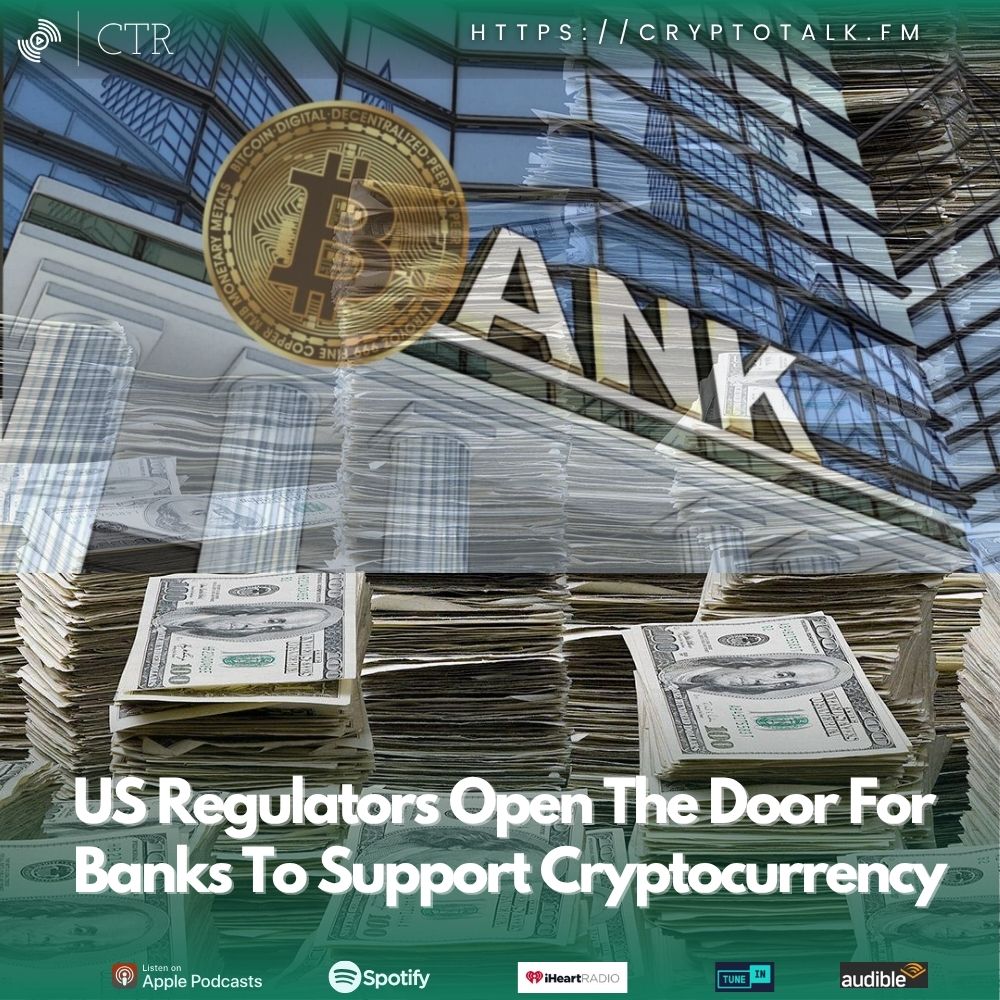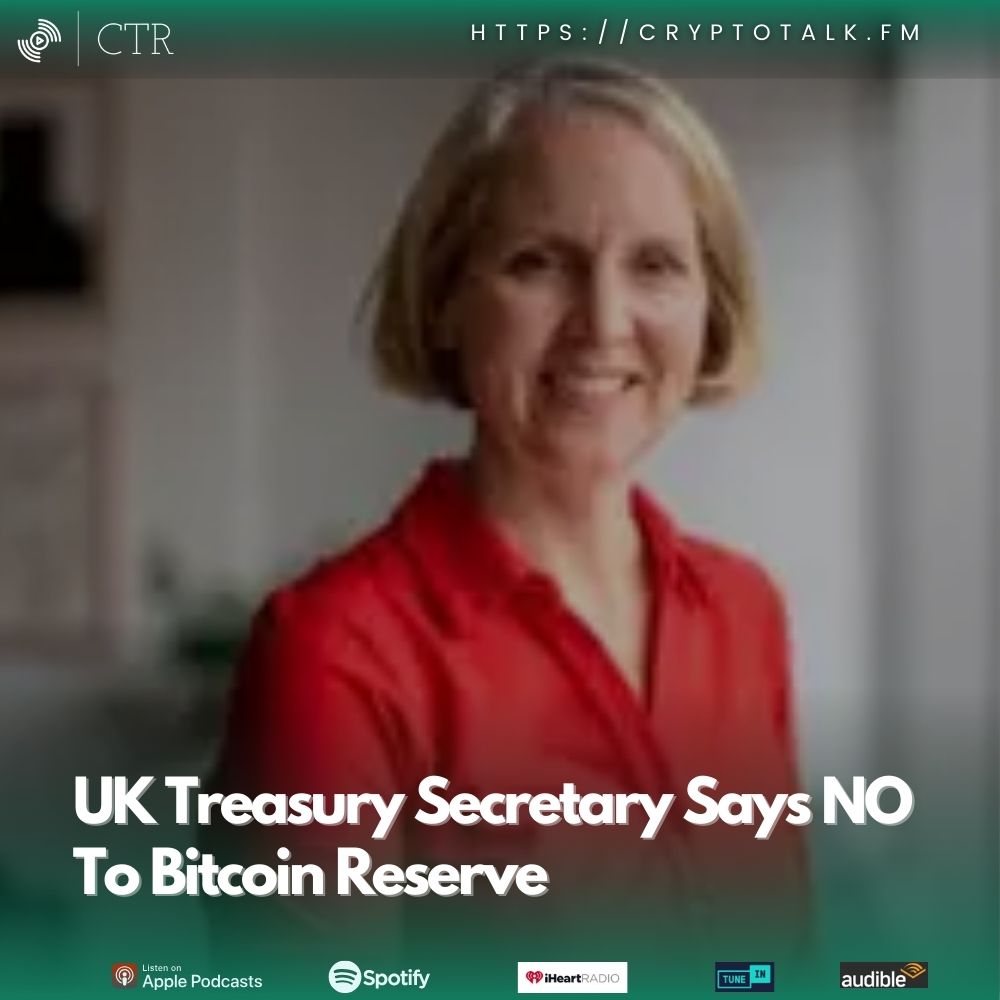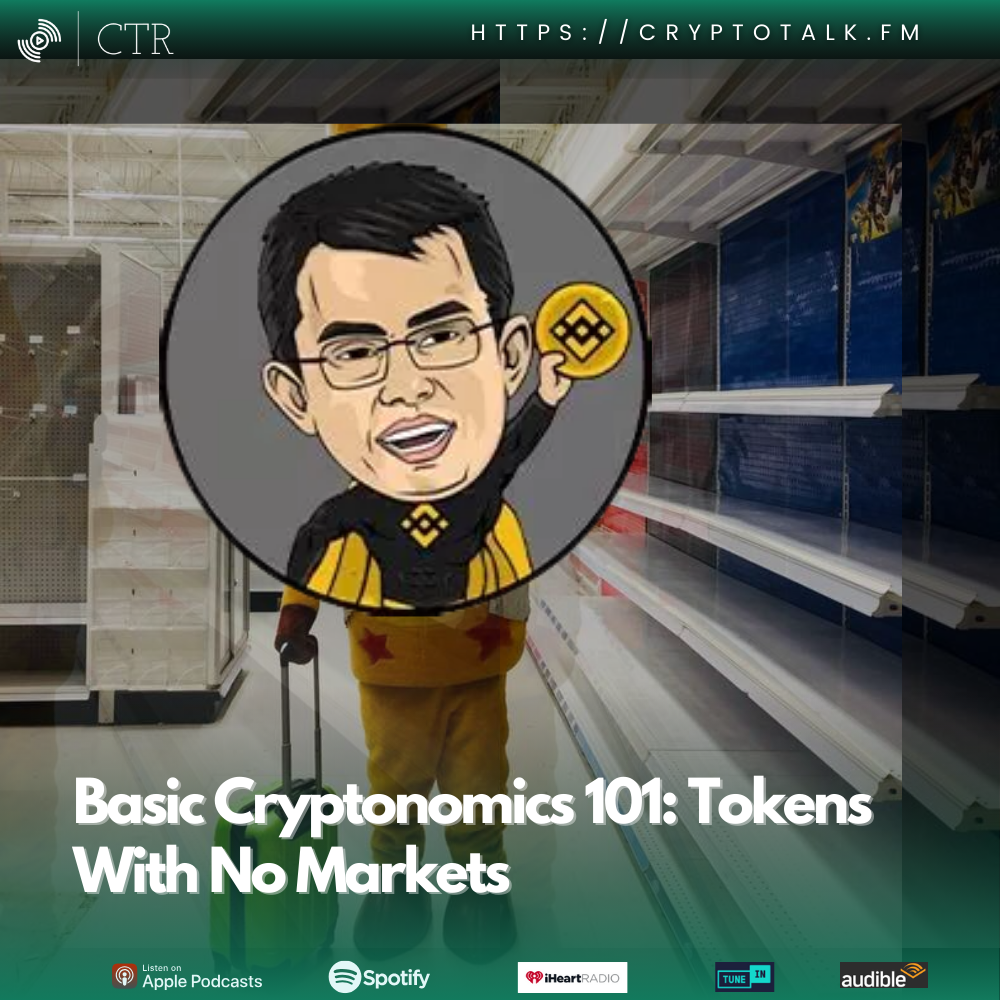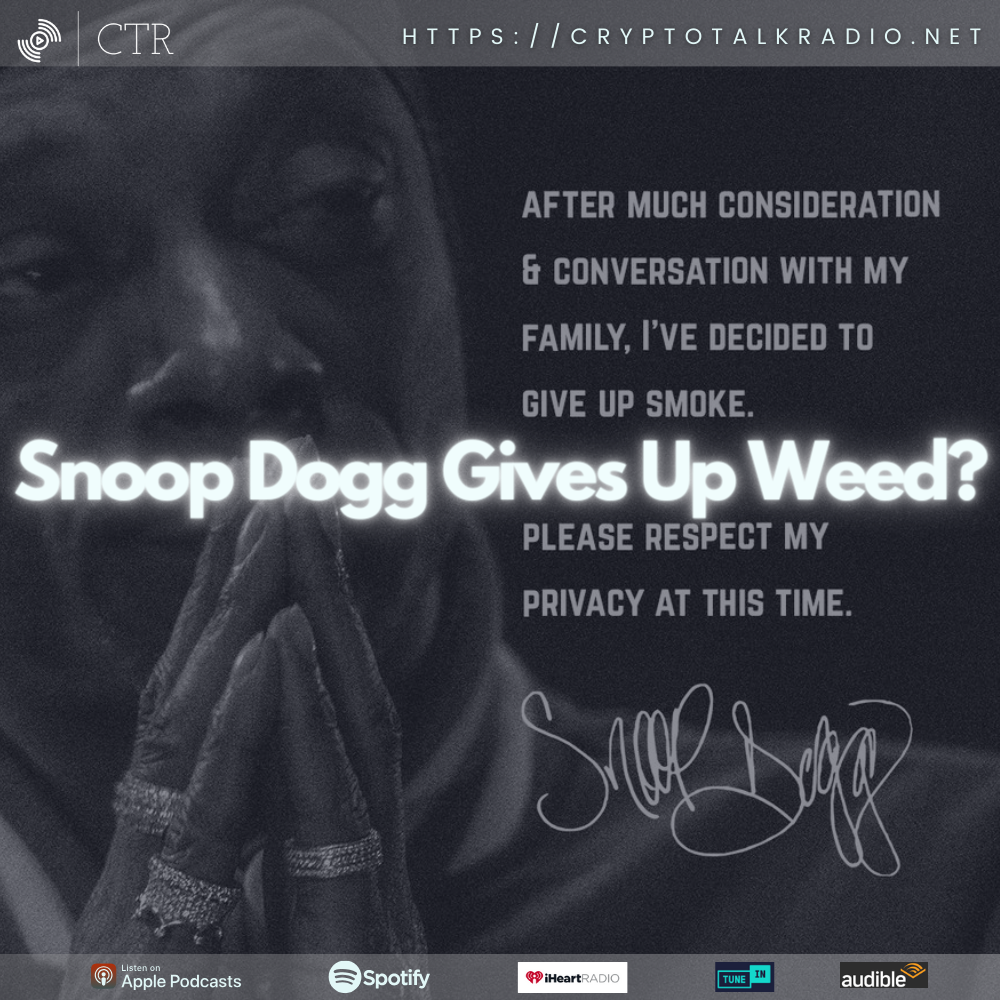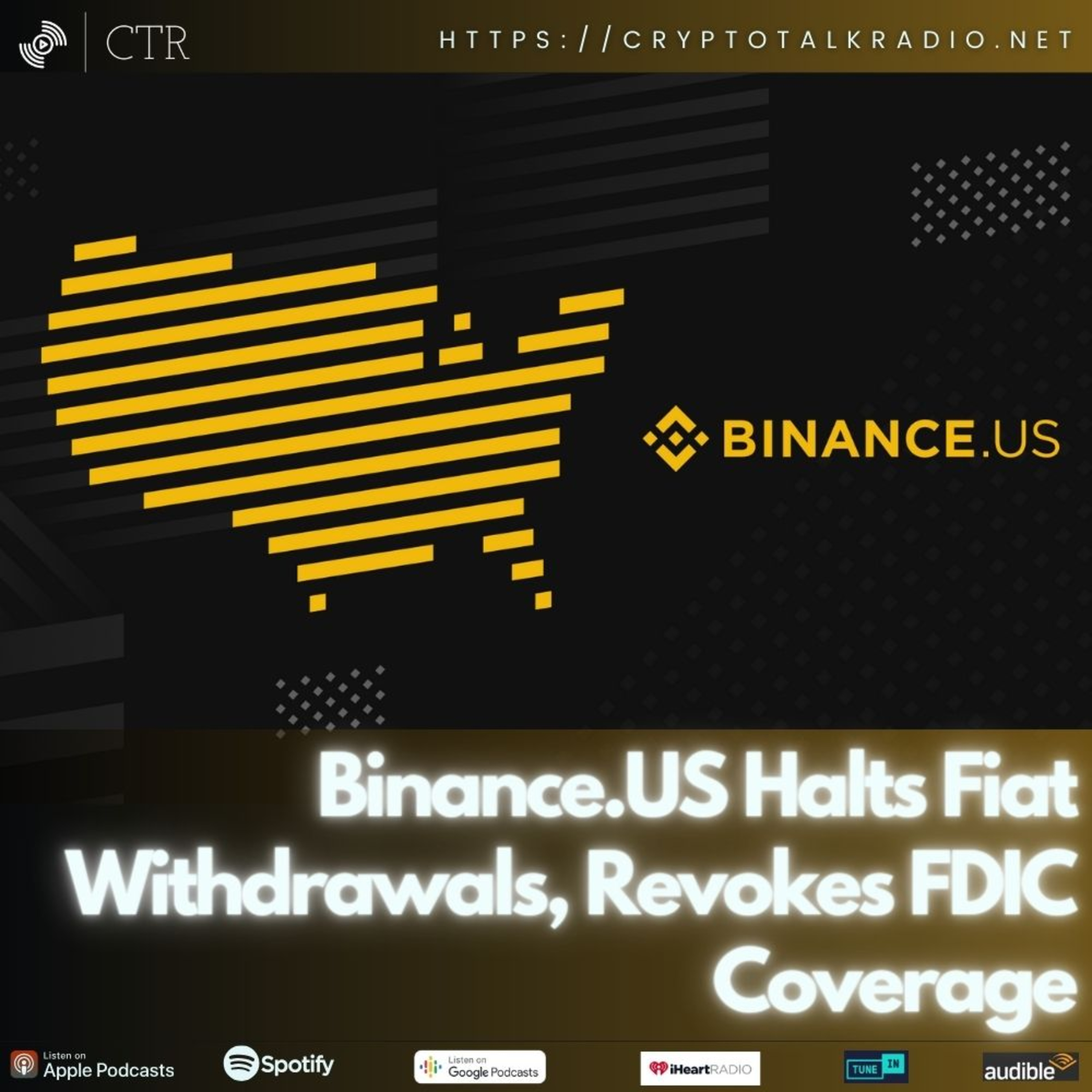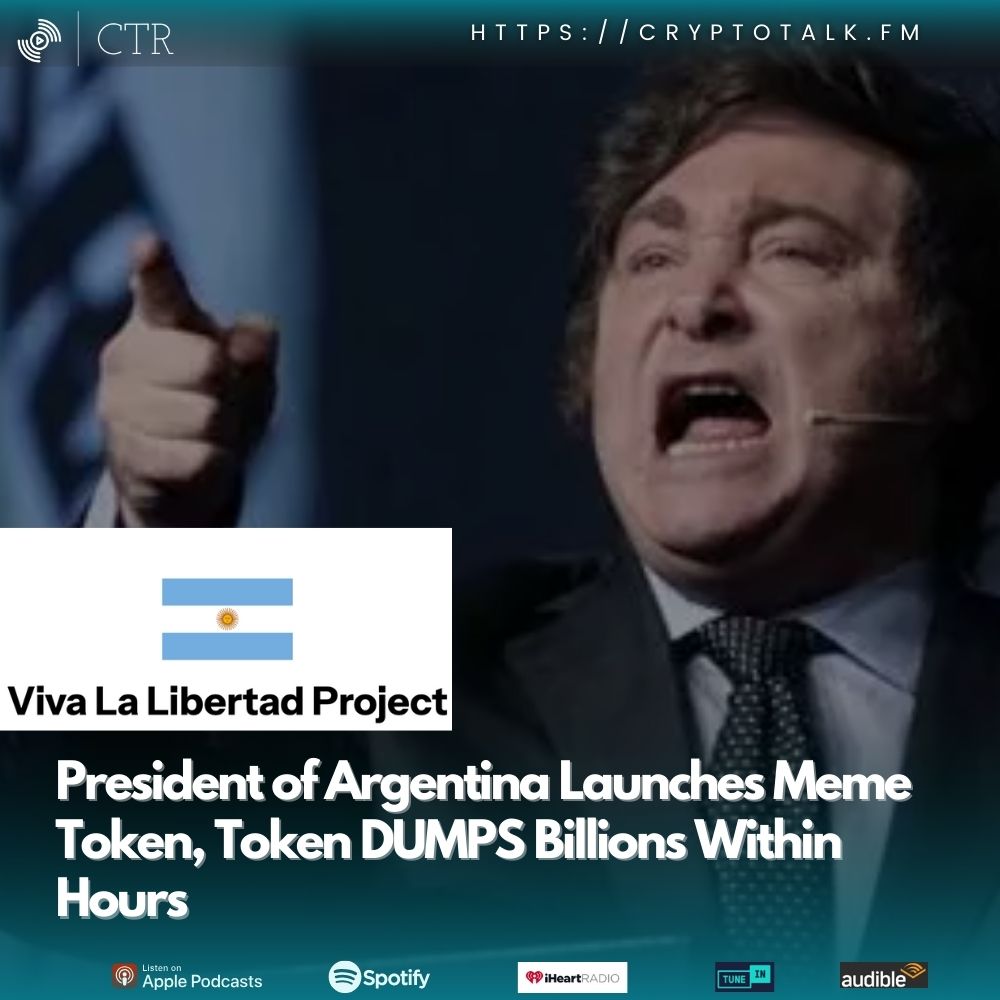[00:00:01] Welcome to Crypto Talk Radio, the podcast for everyday investors like you. Visit us on the
[email protected] and now here's your host, Leister.
[00:00:13] Thank you for that, Bailey. And welcome everybody out there in Crypto Talk radio
[email protected]. you'll never guess what happened. I was sitting in my living room through my, my great room. It's where I am right now recording.
[00:00:26] And I was doing work for my client and I turned, I was wrapping up for the day. I turned around, I have a, it's called a bay window type deal. And four tall windows. They're about maybe six feet tall, maybe five and a half feet tall or six. There's six.
[00:00:45] And I happened to look out and a lady was, she was moving her kids along in one of those wagons and, and she stopped and she took up, she pulled out her phone and she took a photo faced in the direction of my house.
[00:01:01] I thought that was weird, right? But I thought about it. You know, my lawn is perfect. It's just perfect. Everybody else's has like sunflowers and weeds and clovers and mine is just pristine grass. And then my windows, the windows I was looking out have, they're really nice windows, high end windows. They cost me not a fortune, but there is more expensive than regular windows. And then I have a mirror tint, privacy tent so I can see out. Nobody can see it. If you think of like those office buildings, that's what it's kind of like. And I've got a door being replaced this Friday, they told me. And it's got the same kind of glass. And then I got my tent guy coming up to do the tent. And then I've got some, it's like a, like a strip type deal design that I'm going to be doing on the door. So I'm going to have. And then I'm do all the windows that same way. So by the time I'm done, I guarantee my house is going to be amazing. Just simply amazing. That's the, that's the plan.
[00:02:02] But I thought it was weird seeing people. It's so bad of how much I'm just schooling everybody in terms of the appeal, curb appeal that I got people stopping taking photos of my. Because it was mistreated. The property was mistreated, was in bad shape when I took it over and now it's thriving and doing really good. I still have electrical to do that's due in June.
[00:02:22] And I just noticed like my motion light upstairs trips anytime the air conditioner comes on so I know it's a surge. So that's getting taken care of and then things are moving, you know, and I'm not broke. Speaking of broke, you know, let's talk us in cryptocurrency. I don't watch it, but I noticed a couple things I did want to discuss for today's episode.
[00:02:47] CoinDesk.com let's zoom out to the month chart starting with Ethereum because as I've said and if you're new, welcome. But as I've said, Ethereum seems to be the measure for what's really going on in cryptocurrency. And of course Ethereum strong sharp upward trend over the past couple of days went on a run over the past 24 hours.
[00:03:07] I was surprised myself to the point I had to actually take a little bit of profits because it was starting to get a little bit out of control.
[00:03:14] A lower 2400, a high at 2700. Currently hovering around the 2700 mark with a strong upward trajectory.
[00:03:22] And again, when Ethereum starts to run and we're still nowhere close to all time highs, we should get our get kind of back in control. But when Ethereum starts running up tells me that there's some validity in the pumps and not just artificial, which is what I thought Bitcoin was doing.
[00:03:37] Bitcoin over the past 24 hours. A low of 101, a high of 104, just shy 105. Currently hovering at the 104 mark. It doesn't have the same strong upward trend. It's trending upward, but not as strong as Ethereum. Ethereum looks like a rocket ship that might very well get to the 3,000 mark. It would be nice if it did.
[00:03:58] I don't truly know that it will, but it'd be nice if it did. All the other ones as well as Ethereum are running like xrp.
[00:04:06] So I would love to see a theorem hit the 3,000 mark and then it's some it's going to have to come back down just because of what it is. But I noticed that like gas fees were way lower because of Petra and everything else and so that may contribute to another Ethereum pump.
[00:04:20] And then Solana is going to run simply because Ethereum runs. So everything's green other than some garbage tokens as it were.
[00:04:28] So keep your eye out. In my opinion, if you listened for a while. Welcome back. But if you've listened for a while, you heard me say that the chorus can't steer you wrong. You know, Ethereum, Solana, Tron, Avax excerpt they can't steer you wrong. They simply cannot do. It's just time.
[00:04:45] And I heard some people that were just frustrated about like Luna Classic and all these other ones and I keep saying that, you know, the days of dropping something in there and becoming a millionaire overnight are gone. You have to let that go. Unless you're really willing to roll the dice on some garbage tokens, you're not going to make life changing money overnight. But you can if you just sit on it, you know, for and it'll take years. And I know that's frustrating some people but keep in mind many of these took years to hit their all time highs. So they're going to take years to get back to the all time highs and new all time highs are going to be minted by a lot of them. Ethereum by it certainly should hit the 10,000 mark. There's no reason that it should not given where bitcoin is. Bitcoin remember its last all time high was like 65 grand and it's gotten as high as like 110 and it's trending back upward but now it's starting to taper off. But Ethereum its all time high was $4800. We haven't got close to that yet still. So Ethereum still has room to at least double in the basic, but it certainly should be able to hit five figures by now. There's no reason, compelling reason why it shouldn't.
[00:05:55] There's a lot of garbage that's steering people those directions certainly. But I'm saying that people have to certainly get tired of all the garbage and come back to the fundamentals. At least that's my hope. I don't know if that really truly will happen. However, I have one update today. It's probably going to be the only thing I talk about because it's so important. It's a topic I talked about before and that's why it was intriguing to me and it may be the last catalyst necessary for the run we expect today.
[00:06:25] The US Banking Authority, since United States primarily clears the path for crypto services at national banks.
[00:06:32] In an older, older episode I asked the question, what if we could just simply walk into a bank and buy or transact cryptocurrency, don't have to do sketchy exchanges, don't have to get ripped off by, you know, like Manny the rug puller, etc. We can actually work with traditional banks and do cryptocurrency. Imagine if you could take money you already had in the bank and instead of having to go to some exchange who has to take your identity and they're living overseas, stealing your information and selling it to people in India, your local bank who already has your information on file could just let you transact cryptocurrency right then and there. I asked the question and I said that that's the last push we needed. And I did. As a spoiler, there is at least one senator who listens to the show and perhaps that person sent along the information to the right people to try to get the ball rolling. Because the Office of the Comptroller of the Currency confirmed, and this was as of today, national banks are now authorized to engage in a wide range of crypto asset activities, removing longstanding regulatory ambiguities that had kept many financial institutions on the sidelines. In other words, because the regs were so unclear and yet Gary Gensler going and attacking it. Because there were some prohibitions actually in place, many banks refused to even broach the idea of cryptocurrency. And some took the stance of actually blocking you from using your debit card to buy it. I covered that in a past episode too. This is saying it's opening the doors to a little bit more, you know, welcoming for cryptocurrency, people that want to trade it, especially when it's on your own money.
[00:08:09] Quote. In tandem with recent moves by the Federal Reserve, policy shift opens the door for national banks to offer crypto custody, execute trades at customer direction and outsource digital asset services under established third party risk guidelines. Stop. So cryptocurrency.
[00:08:28] Think of the idea that the custody for your cryptocurrency is in the same place as the rest of your money.
[00:08:35] Think of an idea where rather than giving it to a sketchy exchange like MEXC or Weeks or any of the other ones, you can put it in your bank as a trusted source.
[00:08:46] You might ask, what's the real benefit of this? Two One, once again, you don't have to go through BS almost swore BS kyc, because they already have your information on file.
[00:08:56] Two, the potential that the FDIC might be willing to insure at least a portion of it again against losses. They're obviously not going to insure all of it and they're obviously not going to insure large portions of it, but they might be willing to insure some of it because FDIC insurance is part of the banking substructure.
[00:09:15] So there's benefit that the third party exchanges can't offer. Now the third party exchanges offer more customers.
[00:09:23] So when they talk about outsourcing digital asset services, talking about third party risk guidelines, they also have to consider how do they integrate with other exchanges because they want to get access to those customers for trades. If you make a trade, say you want to sell some cryptocurrency, obviously you want to get the best price possible.
[00:09:44] That might be an OTC type trade, depending on the size of it. Well, that means they're going to find a buyer.
[00:09:50] Finding a buyer is probably going to be more difficult in, you know, they might not have another customer at that bank that would be capable or willing to buy that crypto. So they might have to go outside of the confines of those who are currently customers. Now you can kind of see why it's been such a contentious issue for the banks. There's more to it than just pulling the trigger. You have to be really mindful of where am I going to get all these customers to do these transactions and what does that mean from a risk management perspective to make sure they don't get ripped off?
[00:10:22] How do you avoid integrating with the next ftx, right? How do you avoid some of these shady sketchy actors? How do you create safety while allowing the freedom of doing the trades?
[00:10:36] Quote the OCC's announcement, delivered via statement and supported by interpretive letters 1183 and 1184, marks a coordinated rollback of prior restrictions, formally rescinds 2021 supervisory non objection process, withdraws the OCC from two joint interagency statements made in 2023 that emphasize crypto related risks, extends authority by permitting banks to buy and sell cryptocurrencies held in custody when directed by clients and to utilize sub custodians. So long as risk management frameworks align with traditional financial outsourcing standards. Stop. So what that's saying is they're going to focus on cryptocurrency that you provide them custodianship over. So you would have to give it to them just like a regular third party exchange, just like a coinbase or a Robinhood, you have to give them the assets, they become the custodians. So not your keys, not your coins.
[00:11:32] In exchange for the custodianship, you can perform trades, they would have to then integrate with whichever third parties that would allow them to do those trades with those customers that are not part of the bank.
[00:11:43] So it's like they're a broker in a way. And part of the challenge of being the broker of course is tax. And all the tax filing and all the paperwork necessary. Well, the banks already do that, so they already have the framework necessary to do a lot of the tax filings. That's another benefit is if they, if they extend this to their existing footprint for tax filings, it should simplify your tax compliance for cryptocurrency. And then of course, the Trump administration is trying to simplify that framework as much as possible because Donald Trump doesn't want to pay taxes on crypto any more than you do.
[00:12:13] Quote these policy updates align with the Federal Reserve's April 24 decision to retract its pre approval guidance for crypto activities, which had applied to state member banks. Taken together, these actions by the OCC and the Fed dissolved the primary regulatory hurdles that it delayed widespread adoption of crypto services by traditional financial institutions. The OCC stated that the United States banking system is now deemed well positioned to support digital asset activity provided operations remain safe, sound and fair.
[00:12:44] Quote the the move reflects broader market conditions and growing consumer demand. According to an April 2025 Harris poll, approximately 55 million Americans, roughly 21% of the adult population own crypto. Stop.
[00:13:00] So if you think about the scale there, 21%, let's assume 20% of the adult population owns crypto. Now, when they say own crypto, they're likely also including things like ETFs because. And there you don't really own the crypto. But I guarantee you they're including that because I guarantee you, you do not have 20% of United States citizens owning crypto directly. I guarantee you don't. Most ain't heard of it, but they probably have ETFs or something else because it's part of a diverse portfolio. Anyway, let's grant 20%. Let's say 20% of Americans have some exposure to cryptocurrency, with 20% having some level of exposure to cryptocurrency. And this is adults.
[00:13:46] If 20% has it, that means 80% do not. That means there's an 80% potential out there and people who have the opportunity to buy in at some level.
[00:13:57] Now we have to look at how much percentage would be not wealthy enough to be able to do it based on the price, right? If it gets to a price capacity, it doesn't matter how much you buy, it'll never go up, right? And then it becomes not a losing asset, but not a growth asset. One positive of regular banking accounts at least is the fact that you get interest on it, right? You leave it in the bank and you get some form of interest. Cryptocurrency doesn't work that way. You could stake it and then get staking rewards, but you're not really getting enriched off those if the price is stale, if the price is going down, you know, but interest is a different thing. The rate might drop, but you're still gaining. It's always a gain, it's never a loss.
[00:14:37] So that's one paradigm shift that I think a lot of people are sensitive to, is the idea that the bank account gives you at least a little bit of a nest egg. Now, the downside, of course, is that you lose control if the bank decides to seize your assets. The bank shuts down. Anybody who is part of the 2008 where banks are shutting down and people are losing money, that is a real risk. That could apply to, on the crypto side, if you give them custody of the assets, it's the same risk. That's the reason not your keys, not your coins became a thing. The idea that you should not leave it in their hands and you should control it. So my advice always had been, and it doesn't matter if it's a bank or an exchange, do your trade and get it out. You'll hear some YouTubers telling you to leave it in the bank, leave it in the exchange, leave it in the bank and just run longs or perpetuals. And I mean, you go and do that and then lose your assets if you want to do that. I'm not going to recommend you do that. I'm going to recommend you withdraw it and put it in your wallet when you're not in the middle of a trade. That's how I perceive that. And what they're ultimately saying is that this, the bank would allow at least you to do the transaction with a trusted entity. It's. It's an entity that you already trust because you trust them with your money, conceptually. So the thinking is that if you don't have a bank account, but you want to transact crypto with the bank, they probably make you open an account, probably at least a checking account is my guess. They probably require you have a minimum balance.
[00:15:59] You might wonder why. It's because if something were to happen, they want to make sure that you have some money and that you're not left broke. So a lot of times, like say, when you buy a house, they will not let you buy a house if it's going to put you broke. So they want to make sure you have reserves. It's referred to on hand that you got money, even granting escrow, even granting a down payment. They want to make sure you have reserves on hand. You're going to have more money somewhere else that you can tap into and that you're not left broke. You're not because of what happened in 2008 and prior. The idea that people were buying houses they simply couldn't afford, and they couldn't afford the payments, couldn't keep up with it, weren't making enough money, so it doesn't matter. And it might think that it's kind of against you, but it's trying to protect you. They don't want you to go out, get some loan. Let's say it's a $250,000 home. Get some loan for $50,000 just so you can afford the down payment. But you're only making $2,000 a month in income on your job.
[00:16:57] You got to pay bills, water bill, electric bill, property taxes as part of escrow or not, doesn't really matter. You're gonna have to fix something in the house, I guarantee you. You've got shopping, got to do for clothes, food. You got all these things you got to pay for. You might have student loans. By the way, mine are going to come out of forbearance soon and I put it in forbearance. I don't feel like paying for it yet. But you might have student loans, you might have credit card debt, you might have other loans, you might have a car payment. There's all these things that are going to be other expenses outside the mortgage. So if you only made $2,000 a month, you took out a loan to do the down payment. That's why they ask you where the money's coming from. They're trying to make sure you're not putting yourself in the red. Well, I guarantee if this bank thing moves forward and we see banks adopted, I guarantee they will.
[00:17:45] Banks adopt it. They're going to require things like having you have to have an account with us. It has to be a probably a checking account. You have to have a minimum balance at all times.
[00:17:54] It's going to happen because they want to make sure that you are not left broke. You know, gamblers are gamblers, but they're going to want to make sure. So then you could always say, screw that. I'm just going to go to your garbage, Robin Hood or something else instead of going to the bank. And that's fine. The ones that are going to go to the bank are the wealthy mother fathers out there, because they're the ones that need to protect their money.
[00:18:15] And they might have a Private client relationship with the bank. And the bank's gonna want to take care of that client relationship. So they're gonna do everything they can to protect that client because they want to make sure they're getting that money from the client on a regular basis.
[00:18:27] But I think it's great. I love seeing that there's movement forward on something I talked about so long ago, the idea that we should be able to walk into a bank and just do this transaction.
[00:18:36] Now the problem is that banks largely have been gutted.
[00:18:42] So you might say, oh, I got baseball over place. Well, you have Chase, you have Wells Fargo, you have bank of America, those are the big three that are all over the place.
[00:18:52] Lesser degree, you got Citibank, pnc, bmo, you know, lesser degrees, US Bank. I'm talking where I should be able to go to any state in the union, any city in the state and find at least five of these branches, physical branches, not ATMs, branches that I can walk into transactions for What I just described, you're talking Chase, Wells Fargo, bank of America and even bank of America is a stretch at this point. I was surprised at that. Chase is all over the place because they took over, I believe they took over, yeah, Washington Mutual and they took over one other one. So that made it to where Chase is all over the place bank of America was, but then they started closing the branches down. But that was when they took over Wachovia and they, there was one other one they took over.
[00:19:41] Right. And then Wells Fargo has always been all over the place.
[00:19:45] So my point is that we have to see like these small regional ones, they're not going to jump on board on this business. It's going to be a larger bank and you might not have one nearby, so you might be stuck anyway.
[00:19:57] I would recommend though, if you do have a bank, like if you, let's say you have one of these fintech banks, one of these digital online only banks, they're going to jump all over this because from their perspective it's. They've already got the framework to do it. Especially if you tie it to something like Zelle or Venmo or PayPal, because PayPal's already in it. You can use an existing framework to simplify that on ramp. Like I would suspect that any of these fintech ones that are already integrated with PayPal, they would be the first to get in because PayPal already has crypto framework set up because they act like their own kind of quote bank and in a way, so you could see some, let's say not a regional, but like some fintech bank online only that already gets it set up, pulls the trigger, is ready to go. But then you're, you're suffering under PayPal and their propensity to block access to funds.
[00:20:47] So in summary, if you do get notice from your bank, this is available and you decide to get in it, my recommendation to you is it's, there's no problem getting in or trying it, but don't leave your money there. And if it's through PayPal, I would be hesitant because they tend to block funds. It's up to you. But I think it's a dangerous thing. PayPal, I think it's a dangerous thing to consider because again, they like to block funds whenever they feel like it.
[00:21:15] I think the biggest, the best thing you consider doing overall is to make sure, keep an eye out for, okay, here's what this means, here's how this works, here's what we're going to do.
[00:21:27] And then moving forward, decide whether maybe you diversify, maybe you have some that's in your wallet, that's a vast majority of it that you control. You have a little bit in your bank, crypto, whatever, you have a little bit in the third party exchange, whatever, maybe you diversify it that way, I don't know, maybe you set up multiple wallets, I don't know.
[00:21:46] I can't speak to any one strategy. I'm saying that what I wouldn't recommend is to YOLO into the bank side.
[00:21:53] We got to see how the insurance is going to work. We got to see how the oversight is going to work. We got to see how they handle the kyc if it's seamless like it should be, where they don't require doing it again because you already know who you are. We got to see how that whole operation works. Once we see how it works, we can then adjust our strategy to take advantage of it without putting ourselves out. And that's what I'm trying to get across is it's an opportunity to make it easier for the layman person getting the cryptocurrency. But if they add onerous stupid steps to it, it's going to be a step back. And that's what I don't want to see. I want to see that this is pushing crypto forward in the right direction at the right pace and speed and hopefully we do get there.
[00:22:43] Sam.
